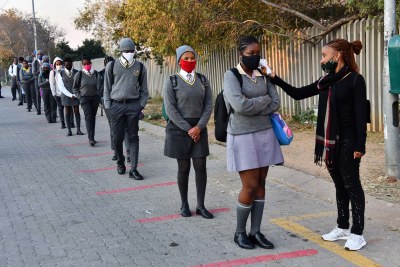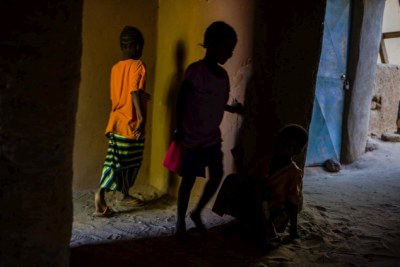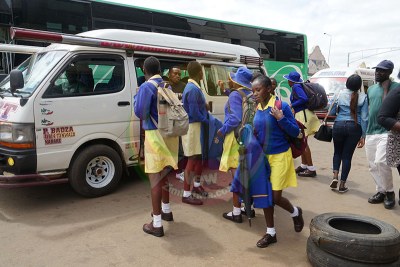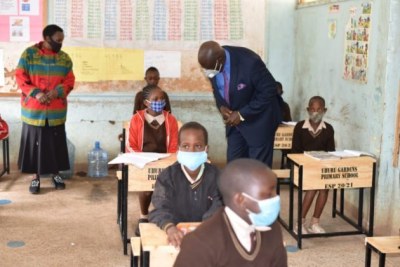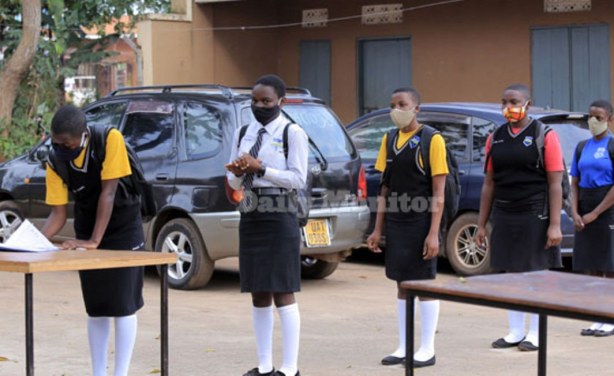-
Africa: Reopening Schools Cannot Wait
Unicef, 13 July 2021
PARIS/NEW YORK, 12 July 2021 – “It’s been 18 months since the COVID-19 outbreak started and education for millions of children is still disrupted. As of today,… Read more »
-
Unicef, 13 July 2021
Around one in three countries where schools are or have been closed are not yet implementing remedial programmes post-COVID-19 school closures, according to a UNESCO, UNICEF, World… Read more »
-
Africa: How Countries Can Reform Education to Get Ahead After Pandemic School Closures
The Conversation Africa, 12 July 2021
The COVID-19 pandemic has resulted in a historic shock to education, shuttering schools for over 1.6 billion children worldwide. This shock will worsen a pre-existing "learning… Read more »
-
Zimbabwe: Teachers Cash-in On Private Online Lessons As Covid-19 Keeps Schools Closed
New Zimbabwe, 13 July 2021
Most primary and secondary school teachers are cashing in on the prolonged closure of schools through conducting lucrative online classes, it has emerged. Read more »
-
Nigeria: Kogi Govt Cautions Against Examination Malpractice - NECO
Vanguard, 13 July 2021
The Kogi Government has restated its resolve not to condone examination malpractices during the ongoing National Examination Council (NECO) examinations in the state. not to… Read more »
-
Rwanda: Primary Leaving Exams Start Amidst Tight Covid-19 Guidelines
New Times, 12 July 2021
Primary leaving examinations started today Monday, July 12, with a total of 254,678 pupils sitting for the exams nationwide. Read more »
-
Tunisia: About 100 Covid-19 Fatalities Reported in Schools During 2020/2021 School Year
Tunis Afrique Presse, 12 July 2021
About 100 COVID-19 fatalities have been reported in schools during the 2020/2021 school year, Education Minister Fethi Slaouti said at the Forum of Careers for Baccalaureate… Read more »
How Africa Can Reform Education Amid Covid-19 School Closures
The Covid-19 pandemic has resulted in a historic shock to education, shuttering schools for over 1.6 billion children worldwide. This shock will worsen a pre-existing "learning crisis" in which many learners were learning very little. The World Bank estimates that the percentage of children who are unable to read a simple sentence by age 10 could rise from 53% before the pandemic to 63% as a result of school closures.
These learning losses could stem from a combination of things - forgetting what was previously known, and missing what would have been learned if schools had not been closed. These learning losses can accumulate in the long run. Students who re-enter school far behind the curriculum expectations might be too far behind to learn anything from daily instruction and fall even further behind.
While Covid-19 has held back learning, bold reform is possible and the pandemic presents a historic opportunity to revamp education systems. It could be a time to institute practices and policies that have been needed to address the underlying learning crisis for decades, writes Noam Angrist for The Conversation.
InFocus
-
The Department of Basic Education has called on all teachers and supstaff to be at school in order to prepare for the Covid-19 vaccination programme. In a statement, the department ... Read more »
-
The unprecedented economic impact of the Covid-19 pandemic, together with global school closures and inadequate government assistance, is pushing children into exploitative and ... Read more »
-
The June 2021 Zimsec public examinations for both O and A-Levels have been cancelled following disruptions caused by Covid-19 and the resulting lockdown. Learners who wanted to sit ... Read more »
-
Learners have returned to school today, January 18, 2021 but the House of Representatives has asked the government to postpone the reopening by three months, due to the increasing ... Read more »
-
Despite learners scheduled to return to classes in January 2021, several schools in Nyando, Kisumu County, might not reopen due to extensive damage to their classrooms and other ... Read more »
